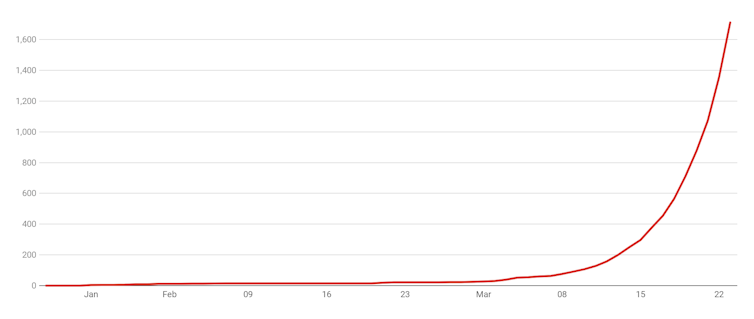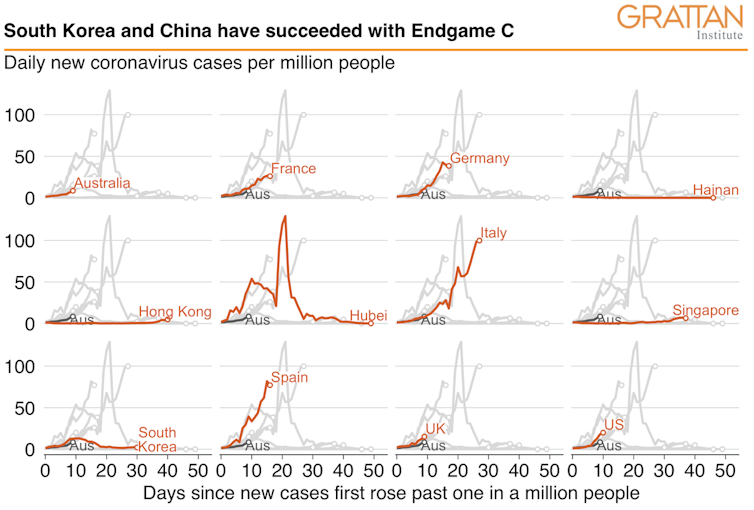We're running out of time to use Endgame C to drive coronavirus infections down to zero
- Written by John Daley, Chief Executive Officer, Grattan Institute
The New South Wales and Victorian governments showed foresight on Sunday by announcing a shut-down[1] of all non-essential activity. On Saturday we described this strategy on Saturday as Endgame C[2] – with the goal to drive new infections down to zero.
But after meeting Prime Minister Scott Morrison last night, the two states backtracked[3] and for now will only close pubs, clubs, cinemas, nightclubs, and restaurants. Schools will be closed in Victoria and the ACT, and parents will be encouraged to keep their children home in NSW.
State governments should stick to their guns and move more quickly to shutting down more non-essential businesses and activities.
Read more: The case for Endgame C: stop almost everything, restart when coronavirus is gone[4]
Our best hope to limit the long-term economic damage and to save the lives of our friends and families is to do everything we can to reverse the spread of this virus.
Coronavirus is growing exponentially in Australia – with a sufficiently broad shutdown, it should fall exponentially as well. Choosing Endgame C now means that the shut-down will be much shorter than if we wait another week.
Australian COVID-19 cases up to Monday March 23
 The goal should be to all but remove coronavirus from the community as soon as possible.
Modelling[5] shows that “flattening the curve” is unlikely to save the health care system, and it definitely won’t save the economy.
Business cannot return to normal while this disease festers. But once infections are very low, tracking and tracing them becomes feasible, particularly if we upgrade existing systems.
Read more:
State-by-state: how Australia's new coronavirus rules will affect you[6]
Whatever restrictions are implemented, the challenge for the states will be to set community expectations so there is all but universal compliance.
The most effective public health messages are clear and simple. When people are told that it is too dangerous to go to a café but they are fine to get a haircut[7], they are right to be confused.
If the messages are contradictory, many people will ignore them, and we will waste our best chance to contain this virus.
Legal enforcement also helps to send the message, and Victorian Premier Daniel Andrews should be commended for announcing that 500 police[8] will be knocking on doors to check that people are following self-isolation rules.
The federal government must also step up and take control of our borders. If they cannot track every new entrant to ensure compliance, the borders should be closed to passengers completely, or quarantine should be enforced in airport hotels.
Australians may be complacent about the spread of coronavirus because we so far have had fewer cases than the UK, the US or Italy. But Australia is a smaller country; we need far fewer cases to create a crisis.
We are only just behind the UK when it comes to coronavirus cases per person, and only a couple of days behind France, Germany and the US. We are in a similar position to Italy three weeks ago.
Our biggest advantage is that we are testing more people than these countries, and growth of infections is a little slower, but there are no signs yet that we are changing the trajectory of our infection rates.
The goal should be to all but remove coronavirus from the community as soon as possible.
Modelling[5] shows that “flattening the curve” is unlikely to save the health care system, and it definitely won’t save the economy.
Business cannot return to normal while this disease festers. But once infections are very low, tracking and tracing them becomes feasible, particularly if we upgrade existing systems.
Read more:
State-by-state: how Australia's new coronavirus rules will affect you[6]
Whatever restrictions are implemented, the challenge for the states will be to set community expectations so there is all but universal compliance.
The most effective public health messages are clear and simple. When people are told that it is too dangerous to go to a café but they are fine to get a haircut[7], they are right to be confused.
If the messages are contradictory, many people will ignore them, and we will waste our best chance to contain this virus.
Legal enforcement also helps to send the message, and Victorian Premier Daniel Andrews should be commended for announcing that 500 police[8] will be knocking on doors to check that people are following self-isolation rules.
The federal government must also step up and take control of our borders. If they cannot track every new entrant to ensure compliance, the borders should be closed to passengers completely, or quarantine should be enforced in airport hotels.
Australians may be complacent about the spread of coronavirus because we so far have had fewer cases than the UK, the US or Italy. But Australia is a smaller country; we need far fewer cases to create a crisis.
We are only just behind the UK when it comes to coronavirus cases per person, and only a couple of days behind France, Germany and the US. We are in a similar position to Italy three weeks ago.
Our biggest advantage is that we are testing more people than these countries, and growth of infections is a little slower, but there are no signs yet that we are changing the trajectory of our infection rates.
 Data current as at Monday March 23, 2020. The rate of testing is not equal across countries. Three-day average of new cases used because not all countries report accurately on weekends.
Source: Johns Hopkins University Center for Systems Science and Engineering.
Our best endgame is to do everything we can to reduce infection rates. Over the coming days there will be many ideas about ways we can minimise the chance of this virus spreading. Some countries have been successful without implementing every single measure.
But every country is different – what works in one climate[9] or culture might not be as effective in Australia. The risks of doing too little too late are high. The risks of doing too much are relatively small.
Read more:
Our politicians are not fit to oversee the coronavirus response. It's time they got out of the way[10]
If Endgame C succeeds, Australians society will be able to slowly return much more closely to normal functioning after eight to twelve weeks.
South Korea, Singapore, and Hubei province in China have successfully implemented Endgame C – and their infection rates have fallen.
Economic life is reappearing, and they now have the benefit of a public health workforce that can focus laser-like attention on any new outbreaks to prevent widespread community spread.
With Endgame C, Australians can have hope for a brighter future.
Data current as at Monday March 23, 2020. The rate of testing is not equal across countries. Three-day average of new cases used because not all countries report accurately on weekends.
Source: Johns Hopkins University Center for Systems Science and Engineering.
Our best endgame is to do everything we can to reduce infection rates. Over the coming days there will be many ideas about ways we can minimise the chance of this virus spreading. Some countries have been successful without implementing every single measure.
But every country is different – what works in one climate[9] or culture might not be as effective in Australia. The risks of doing too little too late are high. The risks of doing too much are relatively small.
Read more:
Our politicians are not fit to oversee the coronavirus response. It's time they got out of the way[10]
If Endgame C succeeds, Australians society will be able to slowly return much more closely to normal functioning after eight to twelve weeks.
South Korea, Singapore, and Hubei province in China have successfully implemented Endgame C – and their infection rates have fallen.
Economic life is reappearing, and they now have the benefit of a public health workforce that can focus laser-like attention on any new outbreaks to prevent widespread community spread.
With Endgame C, Australians can have hope for a brighter future.
References
- ^ shut-down (www.premier.vic.gov.au)
- ^ Endgame C (theconversation.com)
- ^ backtracked (theconversation.com)
- ^ The case for Endgame C: stop almost everything, restart when coronavirus is gone (theconversation.com)
- ^ Modelling (theconversation.com)
- ^ State-by-state: how Australia's new coronavirus rules will affect you (theconversation.com)
- ^ fine to get a haircut (www.pm.gov.au)
- ^ 500 police (www.premier.vic.gov.au)
- ^ climate (www.pnas.org)
- ^ Our politicians are not fit to oversee the coronavirus response. It's time they got out of the way (theconversation.com)
Authors: John Daley, Chief Executive Officer, Grattan Institute







